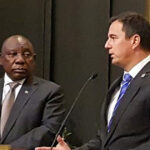Musa Mseleku, the well-known polygamist and star of the reality show UThando NesThembu, is facing serious allegations of fraud and breach of contract.
Zakhele Gumede and Musa Ntsebesha, who claim to have been instrumental in the creation and initial success of the show, allege that Mseleku owes them R200,000 and failed to deliver on a promised 2% ownership stake in his production company, Thanks Ma.
The allegations were brought to light by Ntsebesha during an appearance on the Daily Reports Platform Podcast. He detailed a collaborative relationship that began in 2016, when he first met Mseleku and his wife, Thobile, while working as a consultant for a local municipality.
Ntsebesha explained the genesis of their partnership: “I met Musa in 2016 in one of the local municipalities. Mseleku was one of the consultants there and he was with his wife, Thobile Mseleku. Mseleku approached him about show idea in 2016. I introduced myself to them, and they liked my work. At that time Thobile was working for one of the radio stations in KZN. We developed a good relationship, so much that I ended up managing her,” he explained.
According to Ntsebesha, Mseleku approached him later that year with the concept for UThando NesThembu, seeking assistance in developing the reality show.
“He told me about UThando Nesthembu idea, but he was struggling to get it off the ground. And he wanted to make a reality show but he didn’t have the right skills to do that. As a result, he asked me to assist him. He was impressed with my work on MaKhumalo. And he believed I could do the same with UThando Nesthembu,” Ntsebesha recounted.
Ntsebesha described the initial promises made by Mseleku as exceptionally generous: “In our first meeting, Mseleku promised us heaven and earth. He said our lives will never be the same again as long as we help him to start a production company, Thanks, Ma. The condition was that we’d own 2% shares of that production company. We trusted him and agreed,” he said.
Ntsebesha's account details his significant contributions to the show's development, including writing Season 1 and creating the trailer. He described the initial filming at MaCele's birthday celebration at a Port Shepstone hotel and subsequent studio work with MaCele for voiceovers.
He also recalled the submission of the trailer and Season 1 to M-Net in October 2016, followed by a positive response in January 2017.
“The first shoot was MaCele’s birthday at the Hotel in Port Shepstone, south of KZN. I then took MaCele to the studio for voice over. By this time, Mseleku had promised us written contracts from his lawyers. These …were to detail the terms and conditions of our agreement,” he recalled.
“We sent the trailer and Season 1 in October 2016. And in January 2017 we were called for presentation. The M-Net team was impressed with our work. I can even recall that on our way back to KZN, Mseleku received a message from M-Net informing us that we’ve been successful,” he said.
However, the situation took a turn after M-Net's approval.
Ntsebesha alleges that Mseleku proceeded to exclude him and Gumede from the deal with M-Net, failing to honour the promised contracts and financial compensation.
“Weeks later, Mseleku received another communication. This was informing him that we need to go back to Johannesburg to sign the deal with M-Net. That is where problems started. After that invitation, he never spoke about the deal. I’m not sure who he took to sign, because he left me and Gumede behind. I didn’t follow up on this because I knew we already had a deal with him,” Ntsebesha explained.
He further revealed that M-Net initially approved Seasons 1 and 2, with Mseleku's company receiving 25% of the profits. However, he claims that problems arose from Season 1 onwards, with him and Gumede feeling increasingly sidelined despite their significant initial investment and the unfulfilled promises of shares and payment.
“This is because his company was still new and it was not producing the show. However, problems had already started. From Season 1, we could see that we were no longer welcomed. We couldn’t quit because we’d invested our time in the project and we’d been promised 2% shares,” he stated.
Ntsebesha also described multiple confrontations with Mseleku regarding the outstanding payment and shares.
“We had so many fights with Mseleku because he wanted me to be included as a student. But I refused; I told him I was the main producer. He also didn’t pay us our money, and we didn’t receive the shares,” he said.
Gumede corroborated Ntsebesha's account, stating, “I was there, and it’s all true. Mseleku exploited us.”
Despite repeated attempts to contact Mseleku via various platforms, he has not responded to the allegations. The situation leaves a cloud of controversy hanging over Mseleku's successful reality show, raising questions about the fairness and transparency of his business dealings.











